#nell vance
Explore tagged Tumblr posts
Text


making this everyone's problem this halloween season
#iwtv amc#iwtv#the haunting of hill house#the haunting of hill house by shirley jackson#eleanor vance#nell vance#louis de pointe du lac#horror#vampires
40 notes
·
View notes
Text
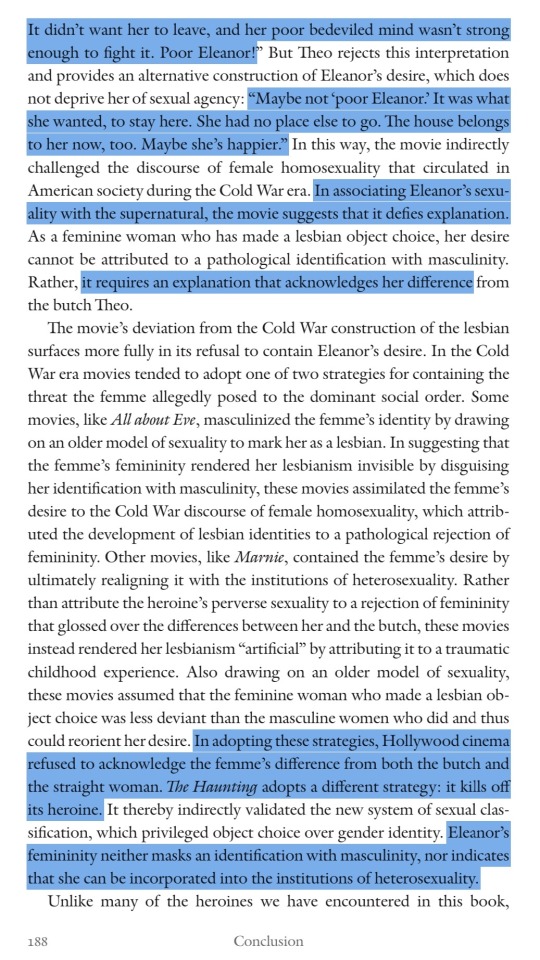
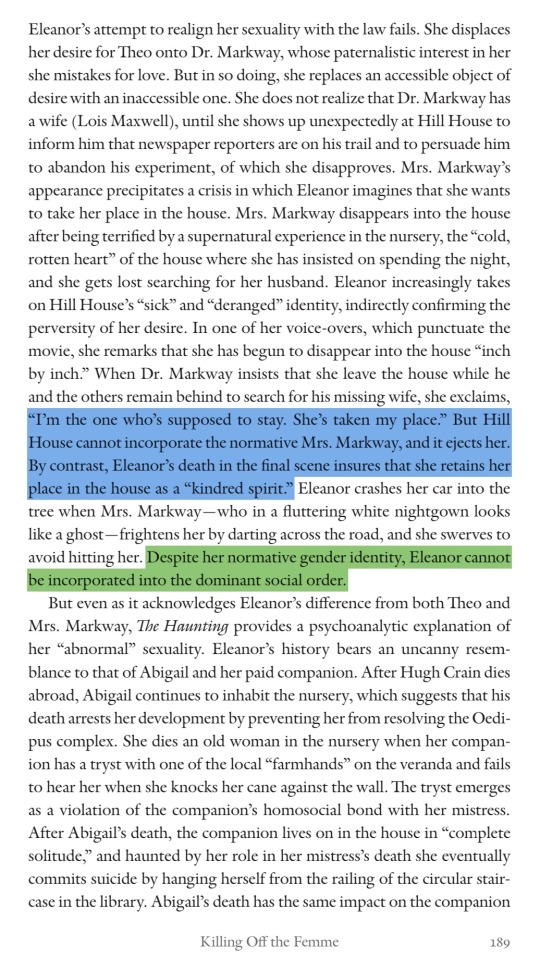
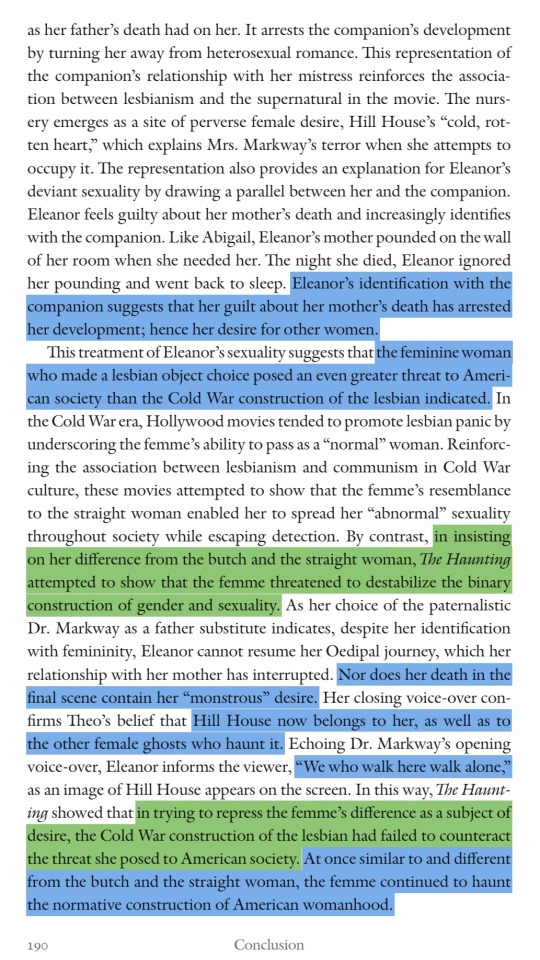
Cold War Hollywood cinema & the threat of the femme to the binary
Conclusion to Cold War Femme by Robert J. Corber (2011)
transcript under the cut
“[…] It didn’t want her to leave, and her poor bedeviled mind wasn’t strong enough to fight it. Poor Eleanor!” But Theo rejects this interpretation and provides an alternative construction of Eleanor’s desire, which does not deprive her of sexual agency: “Maybe not ‘poor Eleanor.’ It was what she wanted, to stay here. She had no place else to go. The house belongs to her now, too. Maybe she’s happier.”
In this way, the movie indirectly challenged the discourse of female homosexuality that circulated in American society during the Cold War era. In associating Eleanor’s sexuality with the supernatural, the movie suggests that it defies explanation. As a feminine woman who has made a lesbian object choice, her desire cannot be attributed to a pathological identification with masculinity. Rather, it requires an explanation that acknowledges her diference from the butch Theo.
The movie’s deviation from the Cold War construction of the lesbian surfaces more fully in its refusal to contain Eleanor’s desire. In the Cold War era movies tended to adopt one of two strategies for containing the threat the femme allegedly posed to the dominant social order. Some movies, like All About Eve, masculinized the femme’s identity by drawing on an older model of sexuality to mark her as a lesbian. In suggesting that the femme’s femininity rendered her lesbianism invisible by disguising her identification with masculinity, these movies assimilated the femme’s desire to the Cold War discourse of female homosexuality, which attributed the development of lesbian identities to a pathological rejection of femininity.
Other movies, like Marnie, contained the femme’s desire by ultimately realigning it with the institutions of heterosexuality. Rather than attribute the heroine’s perverse sexuality to a rejection of femininity that glossed over the diferences between her and the butch, these movies instead rendered her lesbianism “artificial” by attributing it to a traumatic childhood experience. Also drawing on an older model of sexuality, these movies assumed that the feminine woman who made a lesbian object choice was less deviant than the masculine women who did and thus could reorient her desire.
In adopting these strategies, Hollywood cinema refused to acknowledge the femme’s diference from both the butch and the straight woman. The Haunting adopts a diferent strategy: it kills off its heroine. It thereby indirectly validated the new system of sexual classification, which privileged object choice over gender identity. Eleanor’s femininity neither masks an identification with masculinity, nor indicates that she can be incorporated into the institutions of heterosexuality.
Unlike many of the heroines we have encountered in this book, Eleanor’s attempt to realign her sexuality with the law fails. She displaces her desire for Theo onto Dr. Markway, whose paternalistic interest in her she mistakes for love. But in so doing, she replaces an accessible object of desire with an inaccessible one. She does not realize that Dr. Markway has a wife (Lois Maxwell), until she shows up unexpectedly at Hill House to inform him that newspaper reporters are on his trail and to persuade him to abandon his experiment, of which she disapproves.
Mrs. Markway’s appearance precipitates a crisis in which Eleanor imagines that she wants to take her place in the house. Mrs. Markway disappears into the house after being terrifed by a supernatural experience in the nursery, the “cold, rotten heart” of the house where she has insisted on spending the night, and she gets lost searching for her husband. Eleanor increasingly takes on Hill House’s “sick” and “deranged” identity, indirectly confrming the perversity of her desire. In one of her voice-overs, which punctuate the movie, she remarks that she has begun to disappear into the house “inch by inch.”
When Dr. Markway insists that she leave the house while he and the others remain behind to search for his missing wife, she exclaims, “I’m the one who’s supposed to stay. She’s taken my place.” But Hill House cannot incorporate the normative Mrs. Markway, and it ejects her. By contrast, Eleanor’s death in the fnal scene insures that she retains her place in the house as a “kindred spirit.” Eleanor crashes her car into the tree when Mrs. Markway—who in a fluttering white nightgown looks like a ghost—frightens her by darting across the road, and she swerves to avoid hitting her. Despite her normative gender identity, Eleanor cannot be incorporated into the dominant social order.
But even as it acknowledges Eleanor’s diference from both Theo and Mrs. Markway, The Haunting provides a psychoanalytic explanation of her “abnormal” sexuality. Eleanor’s history bears an uncanny resemblance to that of Abigail and her paid companion. After Hugh Crain dies abroad, Abigail continues to inhabit the nursery, which suggests that his death arrests her development by preventing her from resolving the Oedipus complex.
She dies an old woman in the nursery when her companion has a tryst with one of the local “farmhands” on the veranda and fails to hear her when she knocks her cane against the wall. The tryst emerges as a violation of the companion’s homosocial bond with her mistress. After Abigail’s death, the companion lives on in the house in “complete solitude,” and haunted by her role in her mistress’s death she eventually commits suicide by hanging herself from the railing of the circular staircase in the library.
Abigail’s death has the same impact on the companion as her father’s death had on her. It arrests the companion’s development by turning her away from heterosexual romance. This representation of the companion’s relationship with her mistress reinforces the association between lesbianism and the supernatural in the movie. The nursery emerges as a site of perverse female desire, Hill House’s “cold, rotten heart,” which explains Mrs. Markway’s terror when she attempts to occupy it.
The representation also provides an explanation for Eleanor’s deviant sexuality by drawing a parallel between her and the companion. Eleanor feels guilty about her mother’s death and increasingly identifes with the companion. Like Abigail, Eleanor’s mother pounded on the wall of her room when she needed her. The night she died, Eleanor ignored her pounding and went back to sleep. Eleanor’s identification with the companion suggests that her guilt about her mother’s death has arrested her development; hence her desire for other women.
Tis treatment of Eleanor’s sexuality suggests that the feminine woman who made a lesbian object choice posed an even greater threat to American society than the Cold War construction of the lesbian indicated. In the Cold War era, Hollywood movies tended to promote lesbian panic by underscoring the femme’s ability to pass as a “normal” woman. Reinforcing the association between lesbianism and communism in Cold War culture, these movies attempted to show that the femme’s resemblance to the straight woman enabled her to spread her “abnormal” sexuality throughout society while escaping detection.
By contrast, in insisting on her diference from the butch and the straight woman, The Haunting attempted to show that the femme threatened to destabilize the binary construction of gender and sexuality. As her choice of the paternalistic Dr. Markway as a father substitute indicates, despite her identification with femininity, Eleanor cannot resume her Oedipal journey, which her relationship with her mother has interrupted.
Nor does her death in the fnal scene contain her “monstrous” desire. Her closing voice-over confirms Theo’s belief that Hill House now belongs to her, as well as to the other female ghosts who haunt it. Echoing Dr. Markway’s opening voice-over, Eleanor informs the viewer, “We who walk here walk alone,” as an image of Hill House appears on the screen.
In this way, The Haunting showed that in trying to repress the femme’s diference as a subject of desire, the Cold War construction of the lesbian had failed to counteract the threat she posed to American society. At once similar to and diferent from the butch and the straight woman, the femme continued to haunt the normative construction of American womanhood.
#the haunting#the haunting 1963#the haunting of hill house#eleanor vance#nell crain#nell vance#femme#queer femme#butch/femme#cold war#history#queer history#film studies#queer studies#femme theory#all about eve#marnie#robert corber#cold war femme#ableism#suicide mention#homophobia#lesbophobia#character death#image described#mac’s bookshelf#everything goes back to femme
12 notes
·
View notes
Text














Journeys end in lovers meeting.
Nell & Theo The Haunting (1963)
#the haunting 1963#the haunting#eleanor vance#nell vance#eleanor lance#theodora#theo#julie harris#claire bloom#gifs
4 notes
·
View notes
Note
Character lyrics Nell Vance
And as the blood froze in her veins, she said "Well, then, that explains a thing or two! Cause I know I'm the cursed one. I know I'm meant to die- Everyone else can watch as their dreams untie So why can't I?"
"And it's raining and the stars are falling from the sky And the wind- and the wind, I know it's cold. I've been waiting for the day I will surely die And it's here. And it's here. And it's here, And it's here, and it's here, and it's finally here..."
-Shalott, by Emilie Autumn
#ask#monstrousgourmandizingcats#ask meme#ask game#nell vance#the haunting of hill house novel#shirley jackson
7 notes
·
View notes
Text
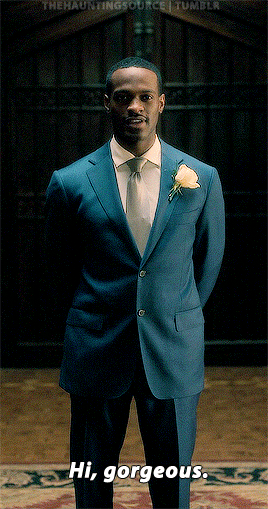
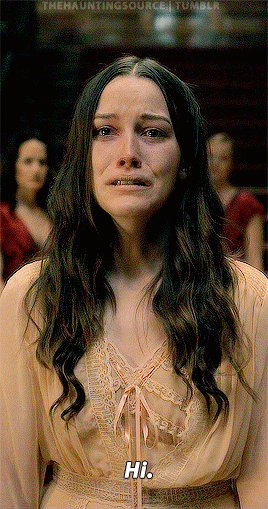
THE HAUNTING OF HILL HOUSE (2018) Episode 5 | "The Bent-Neck Lady"

#the haunting of hill house#thohhedit#nell crain#arthur vance#1x05#*gifs#by vanessa#horroredit#horror#horroredits#dailyflicks#televisiongifs#cinematv#netflixedit#filmtvtoday#dixonscarol#userk8#usermandie#usertj#janielook#usermorgan#userlarri
918 notes
·
View notes
Text
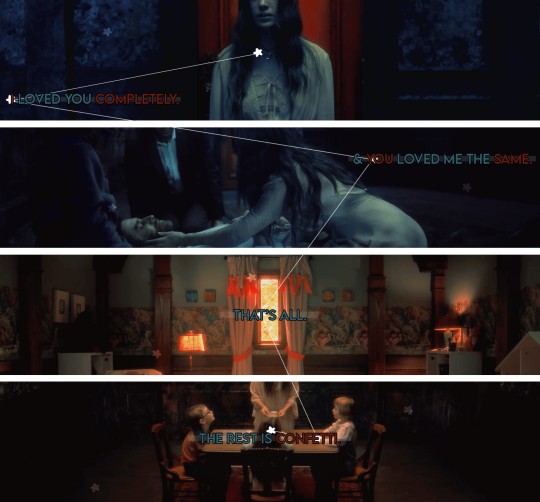
NO, DEAR. USE YOUR CUP OF STARS. INSIST ON YOUR CUP OF STARS. ONCE THEY'VE STRAPPED YOU INTO BEING LIKE EVERYONE ELSE, YOU'LL NEVER SEE YOUR CUP OF STARS AGAIN.
-- The Haunting of Hill House, Dir. Mike Flanagan
#flanaverse#haunting of hill house#the haunting of hill house#nell crain#eleanor crain#eleanor vance#thohh#hill house#ambwoedits
151 notes
·
View notes
Text
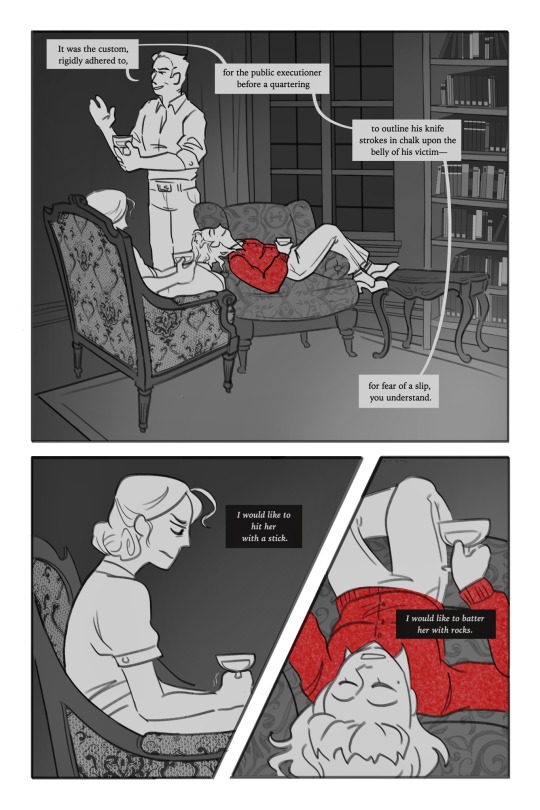



short comic adaptation of a scene from the haunting of hill house, done for my literature class
#i don’t normally share my homework stuff but hey why not#Nell you are so generalized anxiety disorder. god bless.#digital art#art#digital drawing#comic#sequential art#the haunting of hill house#shirley jackson#eleanor vance#cw blood
328 notes
·
View notes
Text

An observation with this genre of ‘little sister’
#oh right i forgot to mention that nell died at the age of 32 and saya died at the age of 33#so yeah#i just watched the hauntinf of hill house and nell’s role broke my heart#these three should meet#falin can talk to ghost this should be plausible#delicious in dungeon falin#dungeon meshi falin#dunmesh falin#falin touden#the haunting of hill house#eleanor crain#the haunting of hill house nell#death mark#shiin#death mark saya#saya kujou#kujou saya#the crain twins#the kujou siblings#the touden siblings#dunmeshi spoilers#thohh#the haunting of hill house spoilers#death mark spoiler#Eleanor Nellie Vance#SAYA STILL HAUNTED THIS DAMN SERIE OK THE RABBIT IS THE HAUNTING#i cant believe the gang (her girlfriend) commit blashemy and completely overturn her fate#spirit hunter death mark#spirit hunter#nell crain
56 notes
·
View notes
Photo


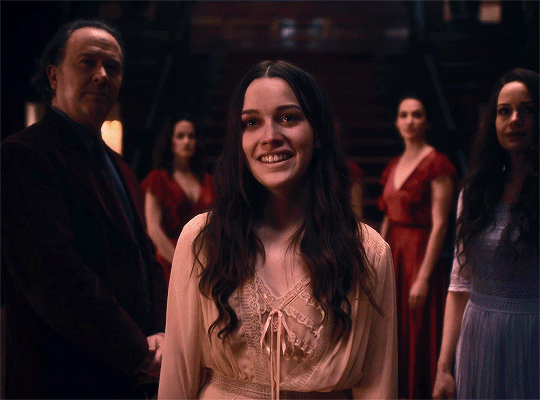
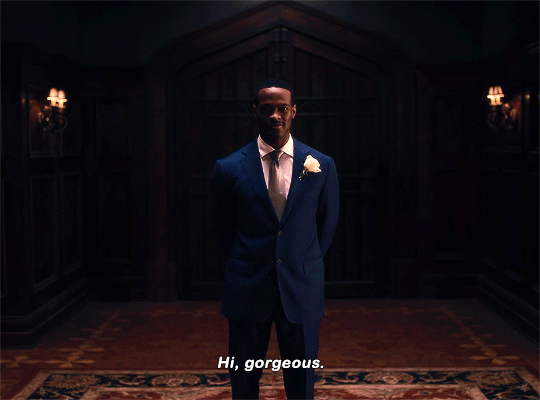
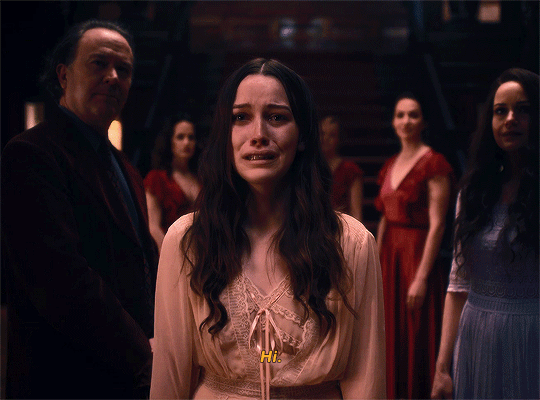
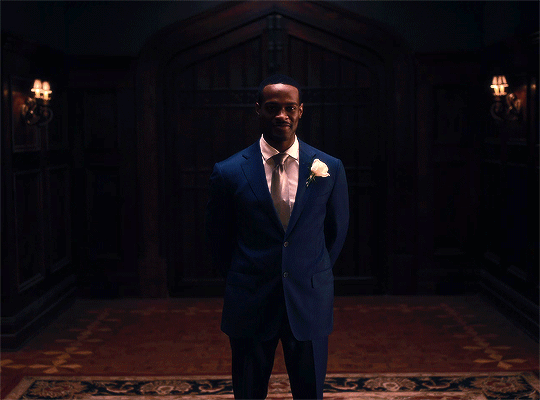

NELL CRAIN VANCE AND ARTHUR VANCE The Haunting Of Hill House (2018)
#The Haunting Of Hill House#THOHH#Nell Crain#Arthur Vance#Horror#Horroredit#Netflix#Netflixedit#TVandfilmsgifs#TVandfilmdaily#Usergif#*#*gifs
575 notes
·
View notes
Text


45 notes
·
View notes
Text

if i’m good will you come back?
#listen to me. two minutes by the amazing devil is a nell/theo song#i know this piece isn’t actually nell/theo but like. the point stands#the haunting of hill house#eleanor vance#my art
25 notes
·
View notes
Text


me and who
40 notes
·
View notes
Text




Mockingjay // Nell Crain, The Haunting of Hill House
#the hunger games#thg#the haunting of hill house#thohh#katniss everdeen#eleanor crain#nell crain#eleanor vance
91 notes
·
View notes
Text
And whatever walked there walked alone

#the haunting of hill house#thohh#thohh book#the haunting of hill house book#eleanor vance#fanart#my art#im thinking about this book again😭#nell
14 notes
·
View notes
Text
I loved you completely and you loved me the same. That's all. The rest is confetti
7 notes
·
View notes
Text
oh, to be in love with a haunted house. oh, to be equally desired by Her.
#eleanor vance#the haunting of hill house#shirley jackson#relating a little bit too much to nell for my own sake
30 notes
·
View notes